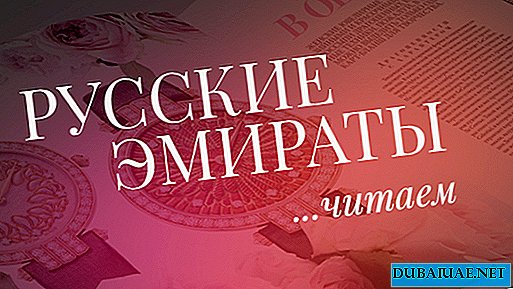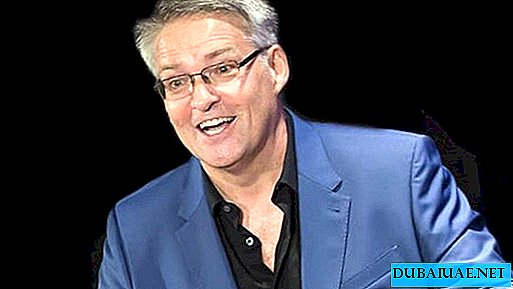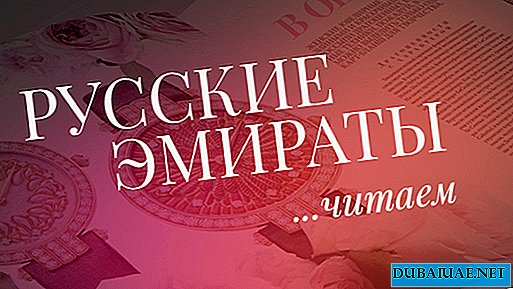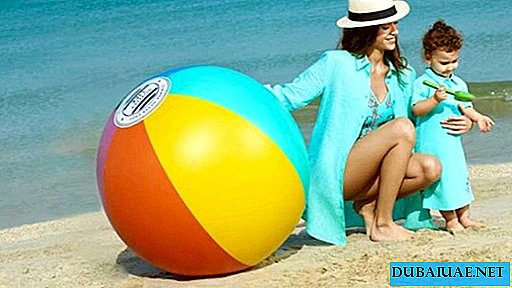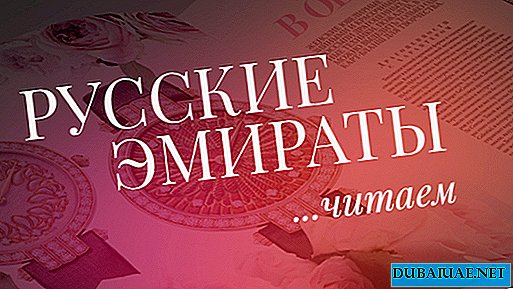For the ninth time, the IDEX 2009 exhibition of defensive weapons took place in the Emirate capital, which takes place once every two years. Russia has traditionally participated in this event since its first steps in 1993, when Moscow contributed a lot to the success of this first parade of military equipment of the leading world powers on the Arabian Peninsula.
UAE President Sheikh Khalifa bin Zayed Al Nahyan and Crown Prince of Abu Dhabi Sheikh Mohammed bin Zayed, having watched the morning live shows of equipment outside the pavilions, drove through the exhibition on white electric cars. After them a train on the same snow-white, noiseless cars was followed by close ones. Between their passages through the exhibition, the country's vice president and prime minister, ruler of Dubai, Sheikh Mohammed bin Rashid Al Maktoum in a yellow dishdash, accompanied by a large retinue of Dubai in colorful national dresses, cheerfully, quickly and non-stop walked.
 This year’s exhibition has expanded in breadth, has become more technologically advanced and somewhat more complex in terms of organization. It was even supposed that journalists would not be allowed to enter the territory of the show on the opening day, and the organizers would issue passes to representatives of the press only on February 23 so that they would not interfere with the top emirate leadership in their important business. At the same time, there were no obstacles to the Russian Emirates journalist accrediting as an exhibitor at the exhibition.
This year’s exhibition has expanded in breadth, has become more technologically advanced and somewhat more complex in terms of organization. It was even supposed that journalists would not be allowed to enter the territory of the show on the opening day, and the organizers would issue passes to representatives of the press only on February 23 so that they would not interfere with the top emirate leadership in their important business. At the same time, there were no obstacles to the Russian Emirates journalist accrediting as an exhibitor at the exhibition.
A special pass was obtained, but this precaution was not required. The organizers retreated. They allowed journalists to open, warning them of the inadmissibility of harassing officials during the ceremony. Photographers were encouraged to register, to put on jackets with the words "Press" pre-sewn for them. The jackets turned out to be quite nice, and the organizers did not fail: the photographers with cameramen were built, and the money spent on white jackets with numerous pockets and bright inscriptions could well be written off for advertising, because they would not be thrown away and would go around the world in the form of souvenirs, on which the word IDEX is clearly imprinted.
The Crown Prince of Abu Dhabi, Sheikh Mohammed bin Zayed, who takes the post of Deputy Commander-in-Chief of the Emirate Army, took a ride around the exhibition to visit the Emirate’s pavilion and entered the Russian one. Met at the exhibition by his old acquaintance, the head of the delegation of the Federal State Unitary Enterprise Rosoboronexport Nikolai Dimidyuk, who has been in charge of interaction with IDEX since 1993, he immediately said: "Show something new from your exhibits!" The Russian general, who holds the post of director on special assignments in this state-owned enterprise, was ready for such a request. He demonstrated new models of armored vehicles, in particular the BTR-90, which can be used not only in the army, but also for police functions, as well as stands with missiles and radars that cause the emirates' greatest interest. After that, the Abu Dhabi crown prince hurried along his other routes, prompted by those who reminded him of the transience of time.
"We are pleased with our exposition, and it has already attracted the attention of interested visitors," Nikolai Dimidyuk told reporters. He added that on the first day of the show, applications for holding meetings from the UAE, Jordan were received. According to the Russian delegation, Jordan is particularly interested in helicopter technology and melee weapons. The Emirate military is interested in Russian air defense systems. Immediately after visiting the Russian pavilion, Sheikh Mohammed paid a visit to the pavilion, led by the chief of the general staff of the Kuwaiti army. Kuwaitis got acquainted with the Russian radar systems, with the nod of understanding that along the trajectory of any missile it is possible to track where it was launched and where it will fall. Our manufacturers, at the same time, were interested in whether the Kuwaiti army was completely satisfied with our Smershi who were put in the emirate more than 10 years ago and offered modernized options. The Chinese exhibitors showed, by the way, the analogues of "The Dead" in their pavilion, which caused perplexing questions from visitors and journalists. Nikolay Dimidyuk calmly reacted to this phenomenon, saying that it was "not a complete copy of our products, and does not undermine our positions in the arms market." The 9th IDEX Defensive Arms Exhibition 2009 was held from February 22 to 26. About 30 defense enterprises producing technical military equipment, missiles, ammunition, and riot control equipment presented Abu Dhabi's products of Russia, a traditional exhibitor since 1993.
The defense industry of Russia at IDEX 2009 for the first time presented the Hermes-A guided weapons complex, and in general more than 500 product samples. With the increasing role of aviation and precision weapons in modern armed conflicts, protection against air strikes is of particular importance. In this regard, military experts will be interested in information materials on the latest Russian developments in the field of air defense, such as the S-400 Triumph anti-aircraft missile systems (air defense systems), Buk-M2E air defense systems and Tor-M2E air defense systems. The air defense systems presented at the exhibition make it possible to create a comprehensive air defense system that intercepts and destroys not only ordinary air targets, but also non-strategic ballistic missiles at various heights and ranges.
The Hermes-A guided weapons complex, developed by the Instrument Design Bureau in Tula, is designed to defeat modern and promising tanks day and night; lightly armored targets, engineering and fortifications, surface targets, low-speed air targets.
 The complex provides the combat qualities of military transport and combat helicopters due to the increased firing range and supersonic speed of the guided missile, reduction of own losses in the conditions of counteracting enemy air defense, defeating small targets irrevocably with one missile, incapacitating large targets due to the consistent defeat of vital elements; high combat performance due to volley fire (with two missiles in a salvo for different purposes) and automation. The complex is located on various military, military transport helicopters and aircraft. Firing range - 15-20 km, maximum flight speed - 1000 m / s, warhead - high-explosive fragmentation, weighing up to 28 kg. For the first time, Russia showed the Komar turret launcher at an exhibition in Abu Dhabi, designed to protect ships and coastal objects from attacks by enemy aircraft and helicopters.
The complex provides the combat qualities of military transport and combat helicopters due to the increased firing range and supersonic speed of the guided missile, reduction of own losses in the conditions of counteracting enemy air defense, defeating small targets irrevocably with one missile, incapacitating large targets due to the consistent defeat of vital elements; high combat performance due to volley fire (with two missiles in a salvo for different purposes) and automation. The complex is located on various military, military transport helicopters and aircraft. Firing range - 15-20 km, maximum flight speed - 1000 m / s, warhead - high-explosive fragmentation, weighing up to 28 kg. For the first time, Russia showed the Komar turret launcher at an exhibition in Abu Dhabi, designed to protect ships and coastal objects from attacks by enemy aircraft and helicopters.
 Already after two days of IDEX 2009, the UAE Armed Forces concluded 8 contracts with foreign and local firms represented at the exhibition in excess of $ 1 billion. The largest contract was signed by the UAE Ministry of Defense with the local shipbuilding company ADSB, which will build 24 high-speed boats for the country's naval forces totaling 935.4 million dirhams (over $ 255 million). Emirates will purchase from Euro-Art three high-tech Cobra radar systems of French-German production worth 892.8 million dirhams (about $ 244 million). Transactions have also been concluded for the supply in the UAE of radio signal systems for equipping tanks, helicopters for the top army leadership, spare parts for military equipment.
Already after two days of IDEX 2009, the UAE Armed Forces concluded 8 contracts with foreign and local firms represented at the exhibition in excess of $ 1 billion. The largest contract was signed by the UAE Ministry of Defense with the local shipbuilding company ADSB, which will build 24 high-speed boats for the country's naval forces totaling 935.4 million dirhams (over $ 255 million). Emirates will purchase from Euro-Art three high-tech Cobra radar systems of French-German production worth 892.8 million dirhams (about $ 244 million). Transactions have also been concluded for the supply in the UAE of radio signal systems for equipping tanks, helicopters for the top army leadership, spare parts for military equipment.
IDEX 2009 spokesman General Obaid al-Katabi said at the exhibition that the defense industry is "the only industry that has not been affected by the global financial crisis." “I don’t think that the (economic) recession had any impact on the defense industry. During the recession, we actually see the largest and best contracts,” he said.
The statement by the Emirate general coincides with the opinion of the head of the Russian delegation at the exhibition, retired Colonel General Nikolai Dimidyuk, who said at a meeting with reporters in Abu Dhabi that the global economic crisis does not impede the development of military-technical cooperation between the Russian Federation and its foreign partners. "Competition in the global arms market continues to grow, despite the economic downturn. The number of applications does not decrease, advance payments arrive on time, negotiations that started before the crisis are not canceled, and Russia will fulfill all the previously concluded contracts," said Nikolai Dimidyuk. The head of the Russian delegation noted Russia's particularly active cooperation in defensive weapons with Kuwait, the UAE and Algeria. "There is ongoing work with these countries to modernize the already delivered military equipment, provide it with spare parts, and find new areas of interaction in the defense sphere," he said.
Sources in the Russian delegation at the exhibition in conversations with the journal correspondent do not exclude the possibility that Russian companies will conclude new contracts here or have reached preliminary agreements on their conclusion. At the opening of IDEX 2009 was attended by the Chief of the General Staff of the Russian Army, General Nikolai Makarov. She was also visited by the former Minister of Defense of the Russian Federation Pavel Grachev, who, under the cries of "Hurray!" even celebrated Defender of the Fatherland Day in one of the Russian pavilions.
“We are not only showing our military equipment here,” said Nikolai Makarov. He emphasized that “along with presenting our achievements, it’s interesting for us to see for ourselves in which direction the development of world military industry is going.”
Along with Russia, companies from Belarus and Ukraine, traditionally supporting this exhibition, took an active part in IDEX 2009. Read more about participating companies and national pavilions of other CIS countries in the magazine "Business Emirates" No. 25 (March-April 2009).


